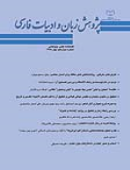گزينش مخاطب درونمتني شعر مشروطه (بر پاية نگرشهاي اجتماعي- سياسي)
محورهای موضوعی : پژوهشهای ادبیات کلاسیک ایرانمحسن ذوالفقاري 1 * , طاهره ميرهاشمي 2
1 - دانشگاه اراک
2 -
کلید واژه: شعر مشروطه نگرش هاي اجتماعي- سياسي مخاطب مخاطب درونمتني,
چکیده مقاله :
يكي از ويژگي هاي ادبيات مشروطه، تغيير حيطة مخاطب است. مقاله حاضر بر آن است تا به اثبات اين نظريه بپردازد كه تغيير حيطة مخاطب در ادبيات مشروطه، تنها محدود به مخاطب برون متني نبوده، مخاطب درون متني را نيز شامل مي شود. پرسشي كه اين پژوهش مي كوشد به آن پاسخ دهد اين است: نگرش هاي جديد اجتماعي- سياسي در روزگار مشروطه چه نقشي در گزينش مخاطب درونمتني و شيوة خطاب داشته است؟ به منظور دستيابي به پاسخ، نگرش هاي نوين اجتماعي- سياسي عصر مشروطه در هفت بررسي شده و در هر بخش تأثير محورهاي ياد شده بر گزينش مخاطب درون متني در ديوان چند شاعر برجستة دورة مشروطه، تحليل شده است. حاصل پژوهش بيانگر آن است كه در بحبوحة انقلاب مشروطه، تحولات اجتماعي- سياسي، منجر به ظهور مخاطبان جديدي در عرصة شعر شد و شيوة رويارويي با بعضي مخاطبان را تغيير داد؛ اما ناكامماندن اين انقلاب و بازگشت دوباره به حكومت فردي (ديكتاتوري رضاخان) باعث گرايش شاعران به سوي مخاطبان شناخته شدة ادبيات كلاسيك گرديد.
One of the best features of constitutional literature is making a number of modifications in the interlocutor’s domain. The present inquiry is to prove that any changes in this domain are not simply restrained to the addressees of extra-textual type but also including the intra-textual ones in the constitutional literature. The question is what was the role of the innovative political and social attitudes in the choosing one of the intra- or extra- types as well as the preference of any types of addressing style? To achieve to the suitable answer, the new attitudes of political - social constitutional era have been studied and divided in seven themes. Then, the effects of the mentioned subjects have investigated in the types of addressees (intra-textural) taken in the poetry works of some famous poets in the Constitutional period. As a result, in the constitutional revolution, a number of social-political changes leaded to the emergence of a new range of poetry addressees, so the style of addressing was modified at that time. However, the failure of the revolution caused the poets to turn back to their previous and accustomed style of addressing.

